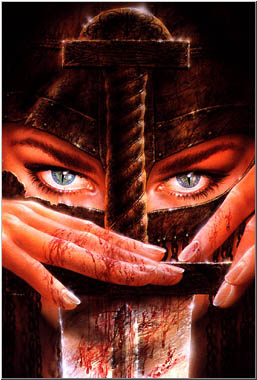
Zamoran

"Torches flared murkily on the revels in the Maul, where the thieves of the east held carnival by night. In the Maul they could carouse and roar as they liked, for honest people shunned the quarters, and watchmen, well paid with stained coins, did not interfere with their sports. (...) In one of these dens merriment thundered to the low smoke-stained roof, where rascals gathered in every stage of rags and tatters -- furtive cut-purses, leering kidnappers, quick-fingered thieves, swaggering bravoes with their wenches, strident-voiced women clad in tawdry finery. Native rogues were the dominant element -- dark-skinned, dark-eyed Zamorians, with daggers at their girdles and guile in their hearts." -- Robert E. Howard: "The Tower of the Elephant"


Zamora is a mysterious land, a buffer zone between the Hyborian nations of the West and the Hyrkanians of Turan, with a culture which is part of each, and part all its own. Its people are disdained by both sides, and even considered "evil by birth" by the Hyborians.
Zamora is an arid, infertile land. The locals live by herding sheep and cattle, which thrive on the thistly scrub of the region, or by mining for tin, copper and other metals. Despite the number of mines, no gold or silver has been found in Zamora.
The Zamorans are a short, dark-skinned race with dark eyes, jet-black hair, narrow features, and stunted limbs.
The Zamorans have a reputation for cruelty, disloyalty and greed. This reputation is only partially earned. Zamoran attitudes reflect more of self-interest than of the high (but often ignored) ideals of the Hyborians. The people are insular, although the increased trade along the Road of Kings has done much to increase Zamoran contact with the Hyborians and Turanians.
The nobles are the law in Zamora. Sentences are maiming or death, with all property confiscated by the noble. Appeal to the king is allowed, although sentences are usually carried out quickly enough to make appeals futile.
The Zamorans worship many divinities. Some are local, embodying natural forces or places, such as Zath, the spider-god of Yezud. Others are imported, such as Bel, Shemitish God of Thieves, patron of the city of Arenjun.
